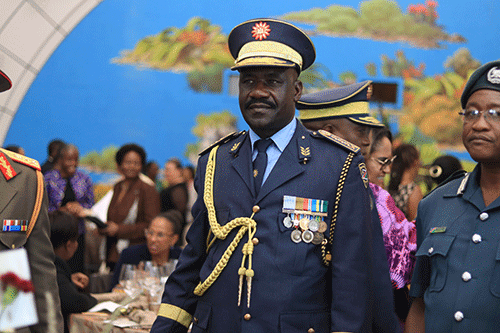Namibia is being infiltrated by human traffickers, who use the country as a gateway to transport victims to other countries, according to Inspector General Joseph Shikongo.
In an interview with New Era, Shikongo said the traffickers are mainly from Asian countries.
Human trafficking is the exploitation of individuals for labour or sexual exploitation, using force, fraud or coercion.
“Human trafficking is serious. When I was in Angola, I was informed that people are flocking into Namibia and passing through our borders to mainly South Africa. Most of these people do not have passports, which show that the human traffickers are using our borders as a getaway to other countries,” he said.
Shikongo, who recently came from meetings in Angola and Botswana to address the issue of human trafficking in the SADC region, said the surge has put the country on high alert, with law enforcement agencies scrambling to crack down on this heinous crime.
In March last year, local police unearthed a possible human trafficking syndicate that lures young Namibians to the Middle East under the guise of job opportunities.
It was reported that 26 Namibians between the age of 27 and 40 have been human trafficked to Oman.
In an investigation that is still ongoing, Shikongo said Namibia has established a relationship with Interpol and missions through the ministry of international relations to repatriate the victims back to the country.
“There are processes involved to get to the bottom of cases such as these. We are also in communication with some families, and contacts were established – but now, it is the issue of diplomacy because for one to move a person from one country to another, it has to be done at a diplomatic level,” he stated.
Shikongo further indicated he would soon have an update on how many of the victims were repatriated and how many are still missing.
He also stated that no arrests have been made so far but suspects have been identified.
“Efforts were made for those Namibians to be repatriated but with regards to the suspects. We know of some agents responsible for human trafficking people – and that issue is still under criminal investigation,” Shikongo said.
Under control
According to the United Nations Office on Drugs and Crime, 52 women and girls were trafficked in Namibia between 2017 and 2020, while 43 men and boys were trafficked.
Despite these cases, Shikongo said, human trafficking in Namibia is currently under control, and the country is doing well in addressing human trafficking globally.
“We have been Tier 1 for three consecutive years. Yes, we have got cases but so far, we are doing well,” he said.
Namibia is the only country in Africa to achieve a Tier 1 ranking, joining 28 countries globally.
A country’s tier ranking reflects the US Department of State’s assessment of that government’s efforts during the reporting period to meet the minimum standards for the elimination of trafficking in persons established under the Trafficking Victims Protection Act of 2000.
In a previous interview with this publication, deputy minister of home affairs Daniel Kashikola spoke of the uncapped and unmanageable routes into Namibia from Angola, which continues to be a headache to Namibian authorities.
Due to that, the number of migrants increases unabated, and related social and legal issues grow.
In the same interview, he also mentioned that it is practically impossible to control the movement of people from and into the country, as there are no barriers or border posts in various areas between the two countries.
Kashikola then assured that government has put measures to control it through strengthening border patrol and community policing.
– ashikololo@nepc.com.na
Caption:


